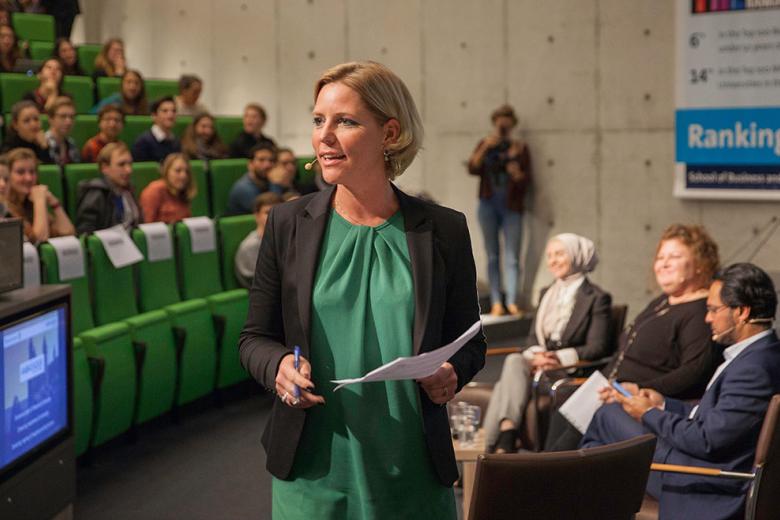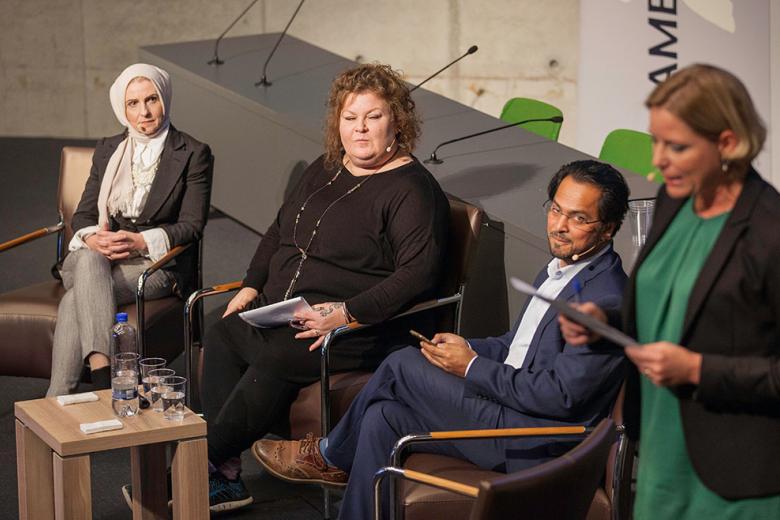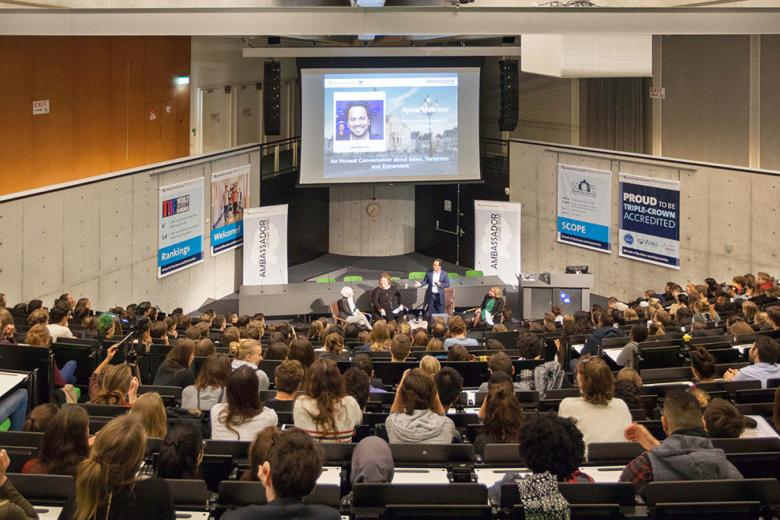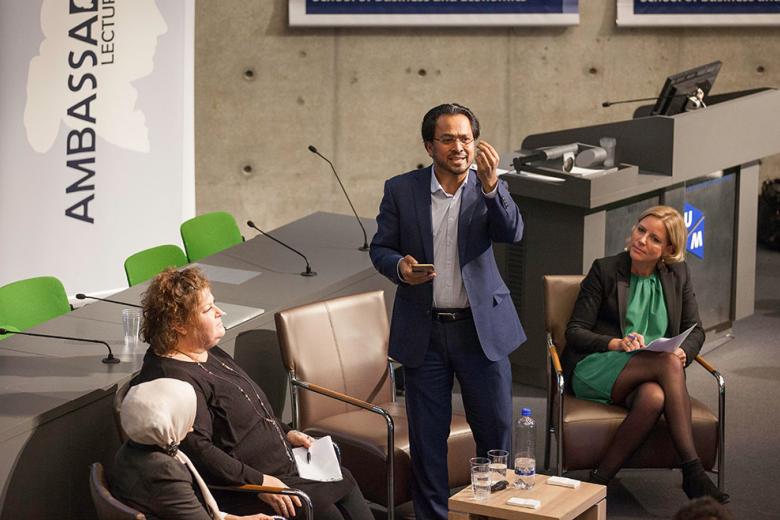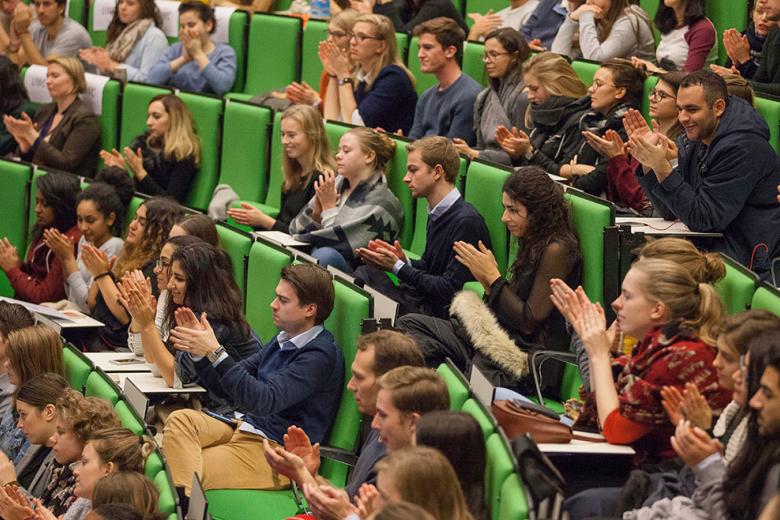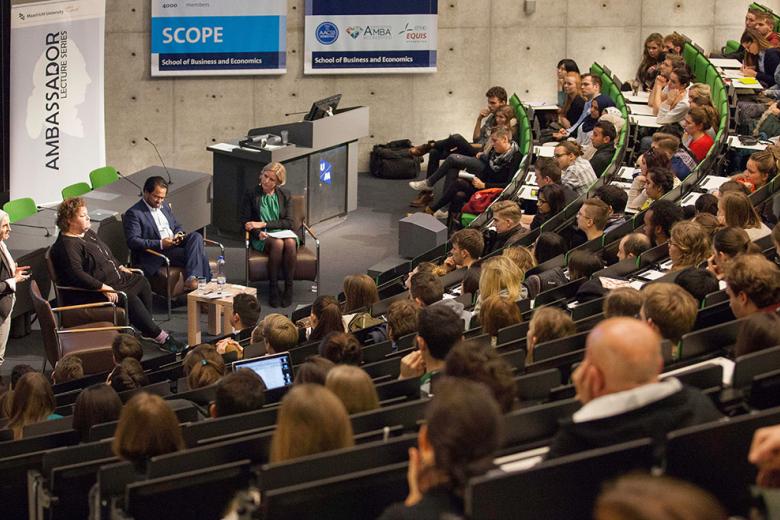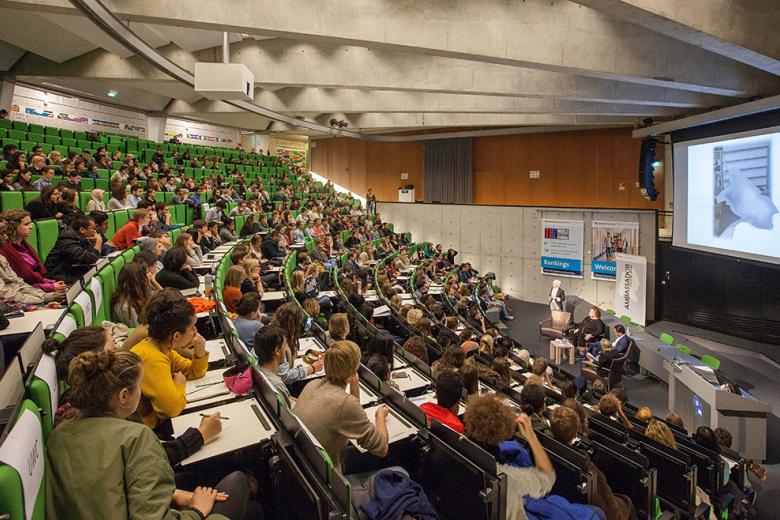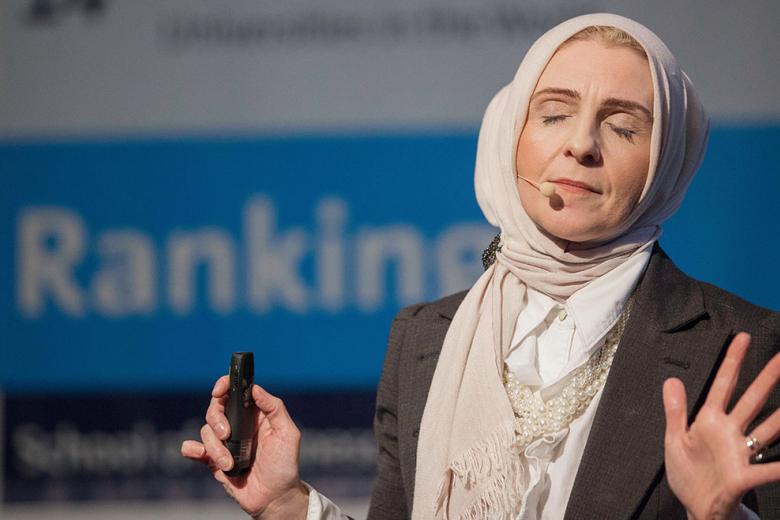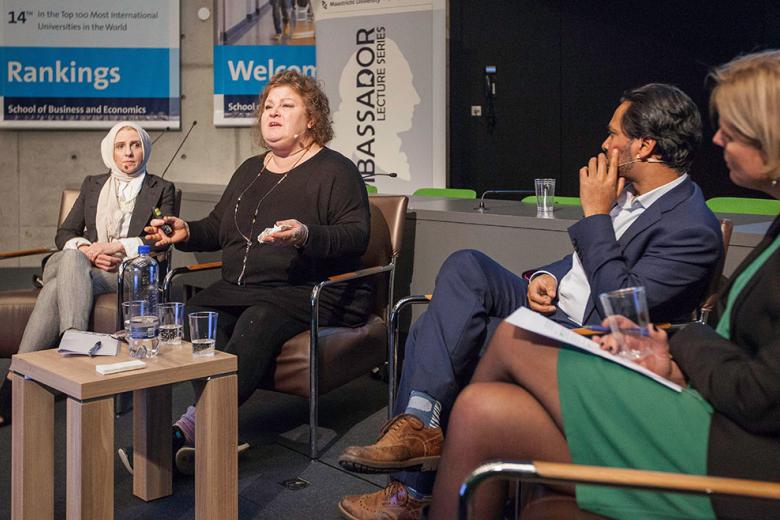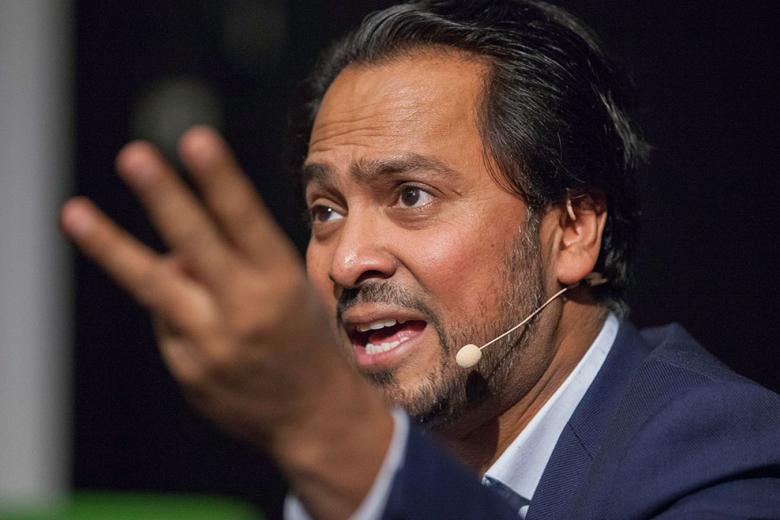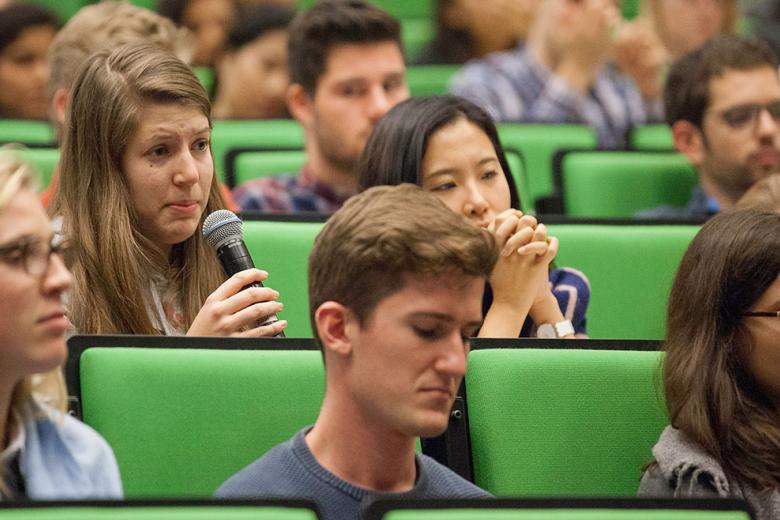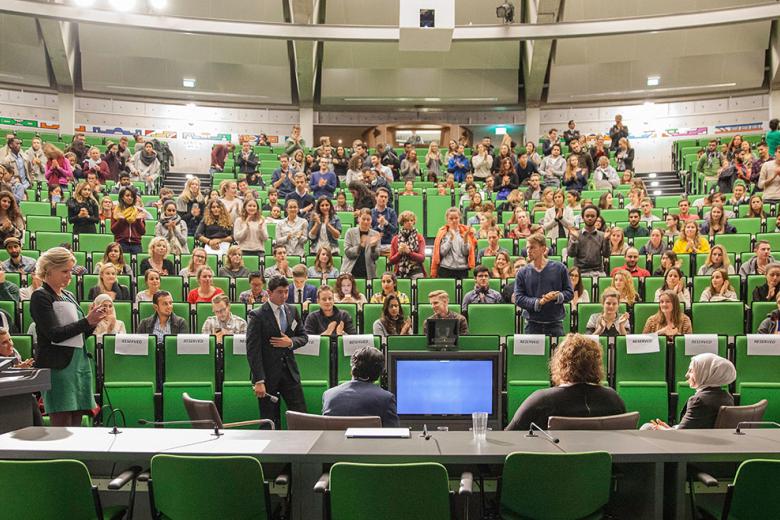A conversation about Islam, Extremism and Terrorism at Maastricht University
It was the first time that mothers Karolina Dam and Nicola Benyahia spoke to an audience of five hundred about their sons, who got killed in Syria after joining Isis. Imam Ajmal Masroor, who preaches in four London mosques each Friday and is a broadcaster and politician, has more experience with large audiences. But all their three stories were equally impressive, at the Ambassador Lecture Series last Wednesday, 23 November at Maastricht University. Two hours before the start of the lecture, the three invited speakers gave an interview about their views on the subject of this evening: ‘An honest conversation about Islam, extremism and terrorism’.
During the official programme of the evening, the mothers shared their personal stories on how their sons Rasheed Benyahia and Lucas Dam joined Isis. Rasheed (19 years old) redicalised in the UK and got killed in November 2015, Lukas (18) left to work in aid camps and died in December 2014. Stories with a similar ending, thought they had a completely different lead-up.
To get an impression of the evening, watch the video!
NGOs
Both women have founded an NGO in their home country: Karolina founded Sons and Daugthers of the World in Denmark, Nicola started Families for Life in the UK. The latter works as a counsellor for young people aged 14 to 25. She was very grateful when she was put in touch with Karolina when her son Rasheed left home and she had to endure ten weeks of radio silence before he contacted her and told her that he was in Raqqa. “I begged the police and the authorities for help, and all they kept saying is: 'We’re looking into it’. I felt utterly powerless. So I searched across Europe, came across the German radicalisation expert Daniel Koehler, who supported me and put me in touch with Karolina. They were vital to me, I don’t know how I would have made it through all of this without them, because I never expected this to happen to me and my family.” And that is the gap she wishes to fill for other families who are going through the same harrowing experience. “Radicalisation and extremism are taboo issues, and we need to start talking about them”, she says.
Karolina Dam works on a broad range of goals with her NGO. “We want to prevent the recruitment of our sons and daughters. We want to give support to the families affected because they’re not getting the support they need, and third, we want to support the system. We want to make sure that the authorities, politicians, school teachers, police have got the key tools to combat this.” Apart from listening to affected families, and talking to authorities, to - for example - change the fact that getting a death certificate for her son is impossible so far, Karolina’s NGO actually tries to stop young people at the Syrian border, and tries to put them into contact with their families again.
The role of foreign politics
Imam Masroor is convinced that extremism is the symptom of a larger problem. “The biggest problem in the world is not terrorism, it is poverty, inequality and injustice. I want to talk about those issues. I want to say: ‘We may be able to bomb Isis, eliminate them from this world, but that’s not going to make our world any better than it is today, as long as there is poverty, inequality and injustice.’ These problems stem from hundreds of years of terrible foreign policies by western governments. They carved up the Middle East without any thoughts on what’s going to happen. The chicken is coming to roost now. Those communities can’t live together in this way. I don’t like dealing with symptoms, I like dealing with the root of the problem.”
Benyahia: “But you have to understand that I’m talking to kids aged 14 to 25 every day, and they are pushed from pillar to post and nobody really gets them. They say to me: ‘You really understood’. And then you can give them hope, that’s what it’s all about. If we can help families sharing their stories and information, we will be able to discover patterns we have to look out for.”
Dam agrees: “ We need to speak up to help other parents. We need to put these words out there, we need to talk about Jihad, because no one else will.”
Masroor: “That’s not the case actually. We won’t be able to do much in terms of stopping this recruitment, even if you were to scream from the pulpit every day. I do every Friday in four mosques, I’ve been doing it for twenty years. The net effect has been very little.”
The roots of terrorism
Imam Masroor is convinced that extremism is the symptom of a larger problem. “The biggest problem in the world is not terrorism, it is poverty, inequality and injustice. I want to talk about those issues. I want to say: ‘We may be able to bomb Isis, eliminate them from this world, but that’s not going to make our world any better than it is today, as long as there is poverty, inequality and injustice.’ These problems stem from hundreds of years of terrible foreign policies by western governments. They carved up the Middle East without any thoughts on what’s going to happen. The chicken is coming to roost now. Those communities can’t live together in this way. I don’t like dealing with symptoms, I like dealing with the root of the problem.”
Benyahia: “But you have to understand that I’m talking to kids aged 14 to 25 every day, and they are pushed from pillar to post and nobody really gets them. They say to me: ‘You really understood’. And then you can give them hope, that’s what it’s all about. If we can help families sharing their stories and information, we will be able to discover patterns we have to look out for.”
Dam agrees: “ We need to speak up to help other parents. We need to put these words out there, we need to talk about Jihad, because no one else will.”
Masroor: “That’s not the case actually. We won’t be able to do much in terms of stopping this recruitment, even if you were to scream from the pulpit every day. I do every Friday in four mosques, I’ve been doing it for twenty years. The net effect has been very little.”
Death threats
The mothers don’t agree and feel a lot can be improved by talking to people, and sharing their experiences. Benyahia: “Because I have been so open to the police, they said to me they’ve learned a great deal from my experience, regarding dealing with recruitment and radicalisation. And they are willing to change things.”
Dam: “I live in Kopenhagen, where we have had a de-radicalisation unit since 2009. My son left in 2014. He was under the radar of the secret police. Why didn’t the secret police contact me? They’re not transparent, they don’t share information. That’s a problem.”
Masroor: “I understand where you’re coming from, because you’ve experienced it and I haven’t. Your son’s involved, my son is too little and I hope he never does. But I’ve been at the receiving end. I have two death threats at the moment, for speaking out against Isis. I had to move home, I’m hiding in a place where nobody knows where I live, because Isis are looking for my head. I think the more we speak about it, the more awareness you create, which is wonderful, but I don’t think that’s gonna stop the problem. When I speak to people in the UK and hear: ‘Muslims are responsible for terrorism’, I say: ‘Muslims are not’. Muslim community did not invade Iraq or destroy Syria.”
Using the Qur’an
Dam is convinced that if she would have known then what she knows now, Lukas would still be alive. “If I knew some of the things that are in the Qur’an, I could have used the Qur’an against my son in the most respectful way. These boys and girls haven’t read the Qur’an. They don’t know what it says. As a mother who has a son who is a convert, I see it as my job to tell other convert parents: ‘Challenge your kids. Drive them up to the imam, because your son can’t choose between the good and the bad ones, because he can’t see the consequences. He’s a child.”
Two hours later this is painfully illustrated by an anecdote from Benyahia, whose son Rasheed always longed for a motor bike. In a Whatsapp-conversation while he was in Syria, he asked her one day: ‘Mom, one of the men here has a motor bike, is it OK if I ride it?’ “He was still this kid.”
By Femke Kools
More information
- The Huffington Post documented Karolina’s story and just a few days before the Maastricht lecture, Nicola was featured in a BBC report about her experiences.
- Karolina Dam started Sons and Daugthers of the World in Denemark, Nicola Benyahia started Families for Life in Great Britain.
- Learn more about Imam Ajmal Masroor at http://www.ajmalmasroor.com/.
A photo impression of the event
Also read
-
Flour, family, and forward thinking: the evolution of Hinkel Bäckerei
In the heart of Düsseldorf, the comforting aroma of freshly baked bread has drifted through the streets for more than 130 years. Since its founding in 1891, Hinkel Bäckerei has evolved from a small neighborhood bakery into a cherished local institution.
-
The University Fund Limburg's new Annual Fund Campaign is live!
Every year during the holiday season, the UM community comes together to uphold a special tradition: supporting projects that contribute to a healthier, fairer and more sustainable society. Will you join us?
-
A new wave of talent emerges from the School of Business and Economics
On Sunday, November 30, 2025, the Maastricht University School of Business and Economics (SBE) proudly celebrated the achievements of over 1,461 graduates from both bachelor’s and master’s programs. The festive ceremony took place at the MECC Maastricht and marked a significant milestone for the SBE
